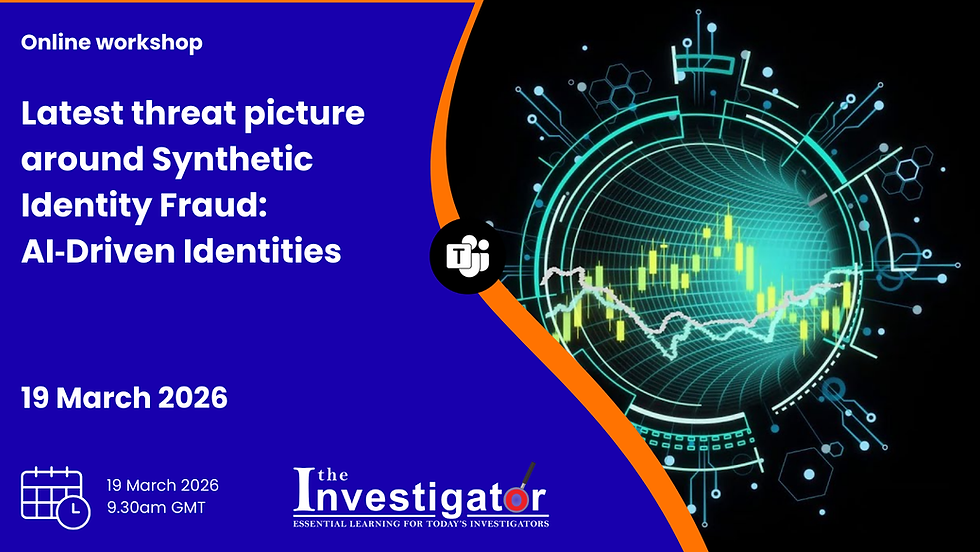

Latest threat picture around Synthetic Identity Fraud: AI‑Driven Identities, 19 March 2026
Workshop provides a comprehensive overview of how artificial intelligence is transforming identity-based fraud. Participants will learn how synthetic identities are created, how AI-generated elements such as deepfakes and synthetic documents are used to bypass onboarding controls, and how these identities are exploited in financial-crime schemes.
Through a structured four-session format, the course covers the mechanics of AI-driven fraud, detection and verification frameworks, anomaly-identification techniques, and real-world case studies.
By the end of the workshop, participants will be equipped to recognise synthetic-identity indicators, assess risk, and strengthen investigative and KYC processes against emerging AI-enabled threats.
Held online via Teams. Certificates of CPD available.
The day will include:
Session One: Understanding Synthetic Identities
This session provides a foundational understanding of synthetic identities and how AI enables the creation of highly convincing false profiles. Participants explore:
-
how synthetic identities differ from stolen identities and traditional impersonation
-
components of a synthetic identity (documents, biometrics, digital history, behavioural patterns)
-
how AI models generate photos, IDs, and supporting documents
-
early indicators of synthetic construction and identity inconsistencies
The session establishes the conceptual and operational base for investigating AI-driven identity fraud.
Session Two: Anatomy of AI-Driven Fraud Schemes
This session examines the mechanics of synthetic-identity fraud as used in real criminal operations. It covers:
-
how synthetic identities are assembled, matured, and tested across platforms
-
tactics used to bypass KYC, onboarding controls, and automated checks
-
use of deepfake video/audio for live verification (“liveness fraud”)
-
hybrid identities: blending real personal data with AI-generated elements
-
criminal business models: loan fraud, BNPL exploitation, mule networks, account takeovers
Participants learn how synthetic identities progress from creation to exploitation in financial systems.
Session Three: Detection and Verification Frameworks
This session focuses on how to detect synthetic or AI-manipulated identities through a structured verification approach. Topics include:
-
multi-layered verification (document, biometric, behavioural, digital-footprint analysis)
-
anomaly detection across identity attributes (metadata, chronology, cross-platform consistency)
-
digital-trace correlation and reverse-search techniques
-
identifying deepfake artefacts and image-generation fingerprints
-
OSINT techniques to validate or invalidate identity claims
The session equips participants with practical tools and analytical methods to detect sophisticated identity fraud.
Session Four: Operational Response and Case Studies
The final session applies all concepts through operational scenarios and real-world examples. It includes:
-
case studies of synthetic-identity fraud targeting banks, fintech, and telecoms
-
investigating failed KYC attempts, document inconsistencies, and behavioural anomalies
-
strengthening onboarding and monitoring workflows
-
escalation paths, reporting requirements, and coordination with fraud/AML teams
-
developing investigative hypotheses and evidence-based conclusions
The session concludes with applied exercises to reinforce how investigators can recognise, assess, and respond to AI-driven identity threats.
About our speaker
Antonio Rossi is a Certified Fraud Examiner with over a decade of experience in the fields of financial crime, fraud investigation, and anti-money laundering (AML).
After working for ten years with a Big Four firm across Europe, he now focuses on training and advisory services for law enforcement agencies, financial institutions, private sector and international organisations.
Antonio has also conducted advanced training sessions on OSINT (Open Source Intelligence) techniques to support investigative strategies.
He regularly collaborates with public and private entities to deliver specialised training on illicit financial flows, cryptocurrency abuse, and risk-based approaches to AML/CTF compliance.
He holds internationally recognised certifications and is a frequent speaker at conferences and workshops across Europe.
HOW TO BOOK
Cost: £209 + VAT (GBP) per delegate per workshop (LEA and Government Agency rate). £249.50 + VAT (Industry rate), per delegate
Group bookings: We offer various discounts for group bookings depending on numbers, please contact us for details.
Student discount: We offer a 35% discount on all of our online events/workshops on condition of payment by card and a valid University email address.
Booking: Please send the delegates name(s), email address(es) and purchase order (made out to The Investigator) to booking@the-investigator.co.uk or telephone +44(0)844 660 8707 for further information.
Payment can be made by PayPal/debit/credit card. The meeting link will be sent out 7 days before the event.

